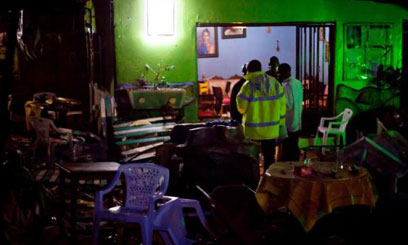 KAMPALA, Sept 16 – A Ugandan judge on Friday jailed a man for 25 years for deadly July 2010 bomb attacks, telling him the atrocity had left an “indelible mark” on the hearts of hundreds of grieving relatives.
KAMPALA, Sept 16 – A Ugandan judge on Friday jailed a man for 25 years for deadly July 2010 bomb attacks, telling him the atrocity had left an “indelible mark” on the hearts of hundreds of grieving relatives.
Edris Nsubuga, 31, who admitted terrorism charges, was spared the death penalty because he expressed contrition over the carnage which claimed at least 76 lives.
But Judge Alfonse Owiny-Dollo told him he had been “clear headed in all that he did,” adding that the sentence reflected the “revulsion with which society has received the heinous deed, regardless of the convict’s expression of remorse.”
Twin suicide bombers struck bars in Kampala on July 11, 2010, where people had gathered to watch the World Cup final. It was the region’s worst attacks in more than a decade.
The attacks were claimed by Somalia’s Al-Qaeda inspired Shebab rebels in revenge for Ugandan military involvement in the African Union force’s protection of the Western-backed Somali government.
Sentencing Nsubuga, Judge Owiny-Dollo said the killings had left an “indelible mark… in the bleeding hearts of many inconsolable families.”
Co-accused Muhamoud Mugisha, 24, received five years for conspiracy to commit terrorism.
Nsubuga, sentenced to three concurrent 25-year sentences, admitted escorting a suicide bomber to a busy rugby club and later detonating a remote-controlled device that he planted at the venue.
He claimed that he had been threatened with beheading if he pulled out of the mission.
“I was just a human being trapped in a web of delusion and manipulation… I am reformed and I am very remorseful,” Nsubuga told the court.
Mugisha admitted fighting for the Shebab militia in Somalia and helping militant leaders plot the Kampala attacks.
He will serve five years and then be placed under police supervision.
Survivors condemned the sentences as too lenient.
“We would have wanted to see more than 25 years for the sentence, so that when they come out of jail they are already old men,” Francis Mugoga, director of a survivors network, told AFP.
“It should have been either life in prison or the death penalty,” he added.
But the prisoners’ lawyer Alex Bashasha said the judge had accepted that the men could be rehabilitated.
“It takes courage to come out and say ‘I did this’,” Bashasha said, adding that the convicts had yet to decide if they would appeal.
The prisoners, both Ugandan, were driven away from court under heavy police security.
The trial of 12 other suspects — including seven Kenyans, three Ugandans and a Tanzanian — is due to resume on November 15. They pleaded not guilty to murder and terrorism charges earlier this week.
Both Nsubuga and Mugisha are due to be state witnesses in that trial.
The bombings were the worst in East Africa since attacks on the US embassies in Nairobi and Dar es Salaam that killed 223 people in 1998.
Most of the embassy attacks suspects were held and tried in the United States.
Fazul Abdullah Mohammed, the Comoran-born suspected mastermind of the 1998 bombings who became Al Qaeda’s presumed most senior operative in East Africa, was killed earlier this year in Somalia.
Many observers saw his rising influence within the Somali Shebab movement waging an insurgency against the government behind the Kampala bombings, which sent shockwaves across Uganda where they are known as 7/11.









































